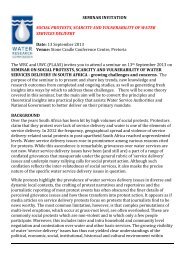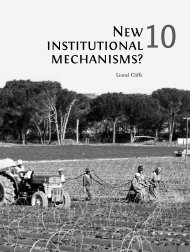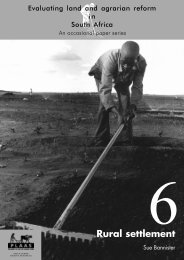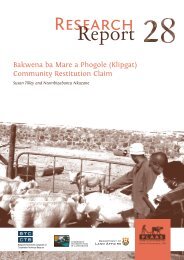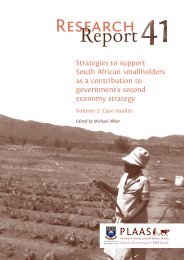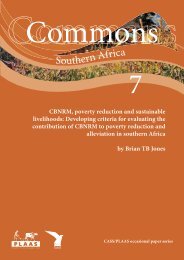A critical appraisal of South Africa's market-based land reform policy
A critical appraisal of South Africa's market-based land reform policy
A critical appraisal of South Africa's market-based land reform policy
Create successful ePaper yourself
Turn your PDF publications into a flip-book with our unique Google optimized e-Paper software.
Chapter 6: LRAD projects in Limpopo<br />
withal, information and contacts to obtain<br />
state <strong>land</strong> on a lease basis some years ago.<br />
Due to holding the leases, they then<br />
became the lucky beneficiaries <strong>of</strong> a<br />
government decision to dispose <strong>of</strong> that<br />
<strong>land</strong> through LRAD. Mr Tshivase, who<br />
acquired a white-owned farm, had access<br />
to significant credit and an ability to seek<br />
out the pr<strong>of</strong>essional assistance he needed,<br />
for example approaching the estate agent<br />
and finalising a deal with the <strong>land</strong>owner.<br />
Mr Kutumela had a civil servant’s retirement<br />
package to enable him to make the<br />
investment required.<br />
The group beneficiaries appear to be<br />
largely poor rural dwellers. However, they<br />
were not without some useful connections.<br />
The Vaalkop project was an initiative <strong>of</strong> the<br />
church that owned the <strong>land</strong>. The initiation<br />
<strong>of</strong> the Mankweng Integrated project was<br />
assisted by the beneficiaries being both<br />
ANC Women’s League members who<br />
attend municipal meetings, and the fact<br />
that they came from the same community<br />
as the Provincial Director <strong>of</strong> Land Affairs<br />
(interview 19).<br />
Some <strong>of</strong> the respondents have experience<br />
<strong>of</strong> farming, mostly gained from their<br />
parents on communal <strong>land</strong>. For example<br />
Mr Ramuthaga (interview 5) said he started<br />
gaining farming knowledge from his father<br />
at the age <strong>of</strong> 12. He then bought some <strong>of</strong><br />
his own cattle in 1992 and kept them on<br />
communal <strong>land</strong>. Others have been farming<br />
as far back as 1970 and have farmed in a<br />
number <strong>of</strong> different communal areas<br />
(interview 6). Only one farm worker has<br />
become a beneficiary and that was in the<br />
Mankweng Integrated project, where the<br />
project incorporated an existing worker<br />
on the <strong>land</strong> (interview 19). Other farm<br />
workers who are involved remain as<br />
workers with no increased stake in the<br />
farms.<br />
Production, employment and<br />
sustainability<br />
As there has been no change in the<br />
production on any <strong>of</strong> the farms due to<br />
LRAD, with the possible exception <strong>of</strong> the<br />
Vele project, one cannot claim any positive<br />
production impact nor any increase in<br />
employment. The farming operations on<br />
the state <strong>land</strong> that makes up most <strong>of</strong> the<br />
<strong>land</strong> transferred were run by the same<br />
farmers before the LRAD initiative. The<br />
Vaalkop project has not involved any<br />
change in living or production patterns as<br />
yet, and would appear to be more orientated<br />
to housing, given the number <strong>of</strong><br />
people involved who all live on the <strong>land</strong>.<br />
The Mankweng Integrated project has not<br />
yet started production, but the fact that it is<br />
providing less than one hectare per beneficiary<br />
indicates that the project will<br />
struggle to create a livelihood for those<br />
involved.<br />
The individually-owned farms employ<br />
from 1–7 people per farm, with most <strong>of</strong><br />
them employing only one or two people.<br />
These employees are all labourers and<br />
from discussions with the farmers it<br />
emerged that they are paid around R300<br />
per month. The workers also receive<br />
benefits such as accommodation and<br />
sometimes maize meal and access to fresh<br />
milk from the cows. There does not seem<br />
to be any intention to comply with the<br />
legal minimum wage for agricultural<br />
workers. 3<br />
This study did not include any detailed<br />
economic or livelihood analysis <strong>of</strong> the<br />
projects, which would be a useful topic for<br />
further research. However, some <strong>of</strong> the<br />
information provided by beneficiaries<br />
gives an indication <strong>of</strong> the benefit <strong>of</strong> the<br />
<strong>land</strong> to them. The farmers at Steilloop, and<br />
Mr Kutumela, all rely primarily on farming<br />
for their livelihoods and some <strong>of</strong> them<br />
report making a reasonable income. Mr<br />
Kgatla sold 65 cattle in 2002 and said he<br />
made around R165 000 (interview 15).<br />
Mr Lehong was also confident that he is<br />
making a reasonable pr<strong>of</strong>it and claimed<br />
that he now has two cars and is able to<br />
send his children to school and college<br />
(interview 13).<br />
The farmers at Manamead, and Mr<br />
Tshivase <strong>of</strong> the Vele Project, all rely on<br />
other sources <strong>of</strong> livelihood and some <strong>of</strong><br />
them reported that they are currently<br />
subsidising the farms with their own<br />
37




